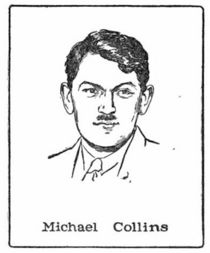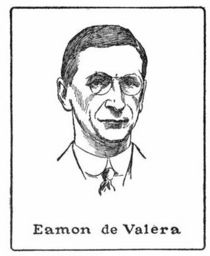Irish Civil War
 From Conservapedia
From Conservapedia The Irish Civil War took place in the Irish Free State in 1922-23 between supporters and opponents of the treaty with Great Britain that had established the Free State.
Contents
Origins of the crisis[edit]
The treaty gave virtual independence to 26 counties of Ireland (excluding the six counties of Northern Ireland), but maintained that the new state remained within the British Empire and that members of the Dail Eireann should make an oath of allegiance to the British monarch - at the time, George V - as head of the Empire. The question of the oath, rather than that of Partition, led to a split in Sinn Fein and the IRA and triggered the conflict that followed.
The split in Sinn Fein and the IRA[edit]
The Dail ratified the treaty on 7 January 1922. Upon this decsion, Eamon de Valera resigned as President and withdrew from the Dail with that part of Sinn Fein which was opposed to it. A substantial proportion of IRA members also opposed the treaty and began to organise for resistance. Throughout early 1922, a number of armed incidents took place as the IRA fragmented, and in May a truce was agreed to arrest the slide to war. A general election on 18 June 1922 saw a clear majority of votes in favour of the pro-treaty Sinn Fein over their anti-treaty opponents (239,193 to 133,864). The new government, led by Arthur Griffith, began to organise the pro-treaty IRA into the National Army (or Free State Army), and formed a new police force, the Garda Siochana (Civil Guard) to replace the disbanded Royal Irish Constabulary.
The Four Courts and the outbreak of war[edit]
In April 1922 a detachment of anti-treaty IRA had occupied the Four Courts judicial complex on the banks of the River Liffey in central Dublin. The British government, incensed by the assassination of Field Marshal Sir Henry Wilson in London, and wrongly believing it to have been committed by anti-Treaty elements (it had, in fact, been ordered by the pro-treaty Michael Collins, incensed by Wilson's role in organising oppression of Nationalists in Northern Ireland), gave the Free State Government an ultimatum to clear the Four Courts. This accorded with the wishes of the government, which wished to assert its own authority, and the courts were bombarded (with borrowed British artillery) and stormed by Free State Army troops after two days, on 30 June. Heavy fighting took place throughout Dublin until the city was secured by government forces on 5 July.
Securing the south and west[edit]
The Free State Army, now lead by Michael Collins, went on to capture the provincial cities of Cork, Limerick and Waterford from anti-treaty IRA in August 1922, ship-borne forces capturing Cork. Because the Free State Army possessed artillery and armoured vehicles, it was able to defeat anti-treaty forces in open combat; therefore the anti-treaty IRA resumed guerilla warfare against the government.
The guerrilla campaign[edit]
The first significant caualty was Michael Collins himself, killed in August 1922 in an ambush in County Cork, only a few days after the funeral of Arthur Griffith, who had died of illness. The guerilla campaign lasted eight months, and was brought to an end by the ruthless policy of repression instituted by the government, harsher than that employed by the British during the Irish War of Independence. The Government began executing anti-Treaty prisoners in November 1922, in reprisal for IRA attacks; one victim was the author Erskine Childers, shot by firing squad on 24 November. The Army also carried out the summary execution of captured anti-treaty forces, in one case tying 9 IRA men to a land mine, which was then detonated. By early 1923 the anti-treaty IRA was cracking under this pressure, and in May it ordered its volunteers to dump their arms - in effect, to suspend the struggle.
Effects of the war[edit]
In total, around 4,000 lost their lives, including 800 Free State Army troops, and massive damage was caused to the country's infrastructure, railways and bridges in particular being destroyed by guerilla forces. The war also had an effect on national politics which has arguably lasted to the present day. The main political parties in Ireland, Fine Gael and Fianna Fail, both owe their origins to the Civil War. Fine Gael evolved from the pro-treaty Sinn Fein which formed the first Free State government; Fianna Fail was founded by de Valera in 1926 when he left (anti-treaty) Sinn Fein to participate in the democratic political pocesses in Ireland.
Further Information[edit]
Categories: [Ireland] [Civil Wars] [British History]
↧ Download as ZWI file | Last modified: 02/14/2023 03:21:23 | 14 views
☰ Source: https://www.conservapedia.com/Irish_Civil_War | License: CC BY-SA 3.0
 ZWI signed:
ZWI signed:

 KSF
KSF